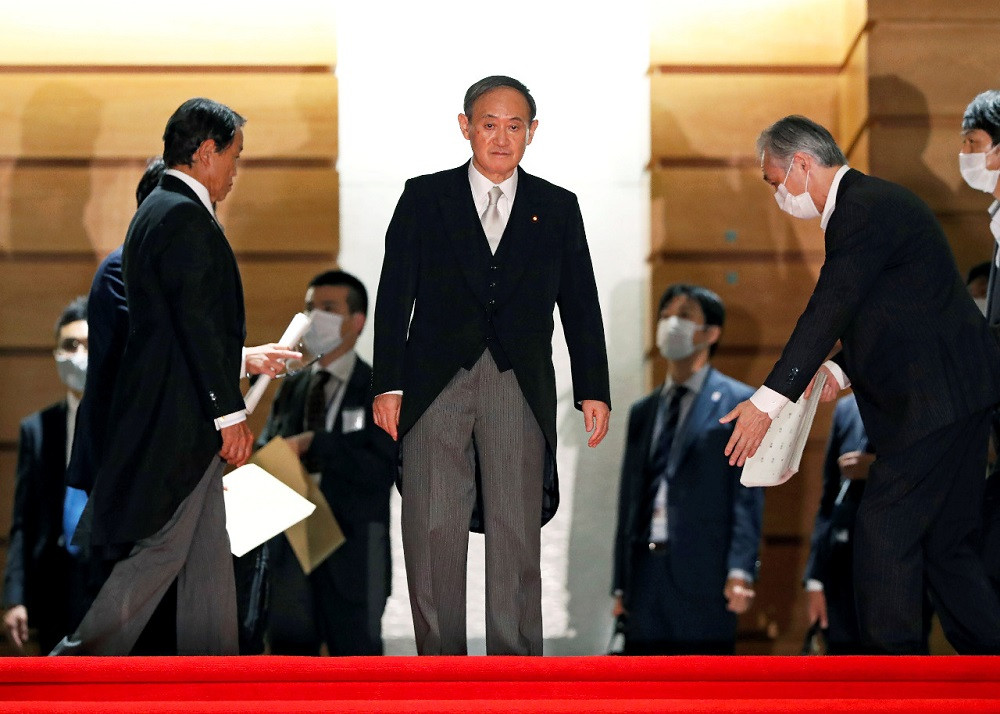Popular Reads
Top Results
Can't find what you're looking for?
View all search resultsPopular Reads
Top Results
Can't find what you're looking for?
View all search resultsJapan-Indonesia relations: Past, present and future
There are some similarities in background between PM Suga and Indonesian President Joko “Jokowi” Widodo. The two leaders are self-made men from struggling families. Their political careers started in the regions before moving to the political centrum, President Jokowi in Surakarta and PM Suga in Yokohama.
Change text size
Gift Premium Articles
to Anyone
A
bout one month after his inauguration, Japan’s Prime Minister Yoshihide Suga will make his first foreign visit to ASEAN countries, Vietnam and Indonesia. Many deem the visit as a wise and deliberative move, symbolizing the commitment of Japan to Southeast Asia heralded by the Fukuda Doctrine in 1977.
There are some similarities in background between PM Suga and Indonesian President Joko “Jokowi” Widodo. The two leaders are self-made men from struggling families. Their political careers started in the regions before moving to the political centrum, President Jokowi in Surakarta and PM Suga in Yokohama.
Both men are also unencumbered by narrow political loyalty. Jokowi, although having run on a political party's ticket, often shows his independence. Suga also came into prominence as a non-faction politician at the ruling Liberal Democratic Party.
Above that, both countries share a similar identity. Both are stable democracies committed to an open, market-oriented economy, culturally tolerant and abhor extremities.
For the past 60 years, Japan has been the most important external source of development for Indonesia. At the same time, Indonesia is the largest development partner for Japan. Japanese overseas development assistance (ODA) has supported Indonesia’s infrastructure, agricultural, industrial, education, health and social developments as well as institutional and capacity building. Japanese foreign development assistance (FDA) has significantly contributed to Indonesia’s economic rise and industrialization.
So far this relationship has grown in a conducive geopolitical environment, in which market economy and democracy serve as its basic institutions. Within that institutional framework, the Japanese public and private sector have contributed to the emergence of Indonesia from among the poorest and most chaotic countries in the region to a stable, modern, middle-income country with expanding markets. On the other hand, Indonesia has served as Japan's pillar in Southeast Asia.
Indonesia is following the trail of Japan to free itself from the middle income trap and strive to become an advanced nation in the next two decades or so. Instead of aid, the emphasis of economic cooperation in the future should be on more investment and trade.
Indeed, Indonesia expects more investment of Japanese companies, not the least related to the policy of relocating Japanese industries from China and as the consequences of Japanese industrial restructuring as well. Indonesia hopes to become the main destination of this industrial relocation policy.
The Jokowi administration has been striving to shift Indonesia into an attractive destination for investment, including through the newly passed Job Creation Law, which aims to provide better governance and ease of doing business, eliminate impediments that have become the subject of complaints from investors and prospective investors.
The nature of future cooperation should be established at a higher level of human resources and technology input and value added chain. Indonesia, while still needing to create basic employment for its huge young population, at the same time is entering a new phase of development that is moving into a knowledge-based, innovative and creative economy, and gearing up for the digital age.
Today’s digital technologies, especially artificial intelligence, are not just another factor of production like machine tools. They can also be about the use of data and the control of information for subversive purposes. In this context, Japan-Indonesia cooperation on cyber and digital technology security and safety should therefore be encouraged.
Regional security has always been a concern in the Asia Pacific and now Indo-Pacific region. Underlying the concern is the common perception of China as an aggressive state and constant threat to regional peace and stability. This concern brought about the alliance of the US, Japan, India and Australia known as the quadrilateral security dialogue or Quad, recently meeting in Tokyo.
On the other hand, ASEAN has its own initiatives known as the ASEAN Outlook on Indo-Pacific.
Amidst the evolving platform of the Indo-Pacific concept, one cannot ignore the centrality of ASEAN in any regional architecture narratives. Indeed, among the regional powers, the most natural relationship and that with the highest potential for sustainability, is that between Japan and ASEAN. These two regions more or less adhere to the same commitment to peace, stability and economic progress.
The two complement each other. ASEAN has vibrant young workers and is enjoying demographic bonuses, while Japan is plagued by an aging and continuously depleting productive workforce.
It goes without saying that in ASEAN, Indonesia is the largest, in terms of geography, population and economy. In the past Indonesia used to be seen as the de facto leader of ASEAN, although lately Indonesia is keeping a low profile. Nevertheless, the stability and strength of ASEAN depend very much on the stability and economic performance of Indonesia.
In the context of dynamic global and regional equation, and the continuing uncertainty and turbulence, bilateral cooperation between Japan and Indonesia should be vigilantly maintained and strengthened; problems identified, issues addressed and misunderstanding avoided.
For those purposes, a bilateral policy dialogue mechanism that was in place in the past between the two countries has now become urgent. Due to aforementioned factors, the dialogue should be larger than meetings among structural-government officials but among eminent persons from both countries with various backgrounds, who can speak not with political authority, but with authority coming from widely recognized experience and competence.
---
Former coordinating economic minister, former Regional Representatives Council (DPD) speaker and a visiting professor at Waseda University










